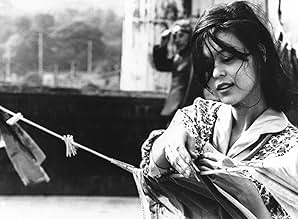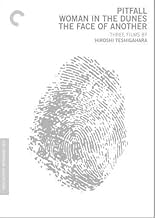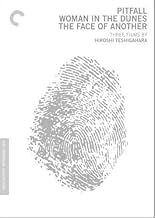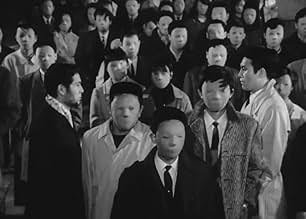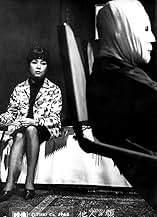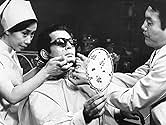VALUTAZIONE IMDb
7,8/10
11.398
LA TUA VALUTAZIONE
Un uomo d'affari con una faccia sfigurata ottiene una maschera realistica dal suo medico, ma la maschera inizia ad alterare la sua personalità.Un uomo d'affari con una faccia sfigurata ottiene una maschera realistica dal suo medico, ma la maschera inizia ad alterare la sua personalità.Un uomo d'affari con una faccia sfigurata ottiene una maschera realistica dal suo medico, ma la maschera inizia ad alterare la sua personalità.
- Premi
- 2 vittorie totali
Robert Dunham
- Foreign man in Bar
- (non citato nei titoli originali)
Recensioni in evidenza
Okuyama is an engineer whose face was horribly mutilated in a workplace accident. Feeling shunned by society and rejected by his wife, he shamefully hides his disfigurement behind layers of bandages. After consultation, a psychiatrist offers to make Okuyama a realistic prosthetic mask, to return some semblance of normality to his life. Okuyama accepts, despite the shrink's warning that the mask may alter his personality. Meanwhile, a similarly disfigured young nurse from Nagasaki travels to a seaside resort with her brother, where the depth of her disaffection with the uncaring world around her makes itself known in shocking and unexpected ways.
Based on Kobo Abe's novel of the same name, Hiroshi Teshigahara's 'The Face of Another' is a dark, intriguing drama examining notions of identity, appearance and personality, and how the three intersect. Abe's screenplay tackles these themes- as well as that of cultural identity- maturely and with great tact, while also retaining much narrative tension. In fact, if one wished to disregard the psychological and sociological aspects of the story entirely- interpreting the film simply as a horror with a lot of wordy dialogue- one could; and the impact of 'The Face of Another' wouldn't be much diminished.
It is a rewarding experience, however, postulating on the psychological questions raised by Abe's narrative, specifically whether or not one's personality is influenced by one's looks, and the extent to which one's looks informs one's quality of life. It is commonly accepted that physical appearance does have a meaningful impact on people's life experiences and opportunities. Researchers like Daniel Hamermesh posit that the traditionally handsome and beautiful generally have an easier time of things than their less attractive counterparts. At the same time, according to the theory of facultative personality calibration, personalities develop in a way that match other genetic traits, so that one who is more handsome will be more assertive or confident, and vice versa.
'The Face of Another' provokes contemplation around- and plays into- these ideas, as well as examining how Japanese cultural identity was irrevocably altered following WWII and the devastation of Nagasaki and Hiroshima. Okuyama's loss of face and adoption of the mask suggests that one's face is not just a physical feature, but a means of communication with society and oneself. By losing this means of communication, Okuyama loses his connection to his original culture and sense of self. So too did the destruction of Nagasaki and Hiroshima alter the face of Japanese society, ensuring that post-war Japan was- in some ways- indistinguishable from pre-war Japan. In this regard, the film suggests that identity- both personal and cultural- is fluid, and heavily influenced by external factors.
The film inspires rumination around these notions, whilst stunning with its visuals. Hiroshi Segawa's cinematography and shot construction is striking and strange, heightening the eerie tone of proceedings. His work, heavy in visual metaphor, lends sequences- such as a breath-taking, multi-masked crowd scene- an odd but undeniable power. Utilizing a wide variety of stylizations- including bizarre zooms, x-rays and jump cuts- he keeps things feeling consistently fresh, innovative and off kilter. This is only compounded by Arata Isozaki and Masao Yamazaki's surrealist art direction, as well as Yoshi Sugihara's assured, experimental editing, which holds everything together masterfully.
One would be remiss not to discuss the score from Toru Takemitsu, which fluctuates between the macabre and the mournful, while always remaining melodic. The main theme- entitled The Waltz- is particularly atmospheric and haunting, reflecting through it's bittersweet melody Okuyama's fragile psychological state. Furthermore, Taichiro Akiyama's sterling efforts crafting all the masks must be mentioned, as there are a great many throughout the picture and each one is spectacularly insidious.
'The Face of Another' boasts a fine cast of actors all doing superlative work. Tatsuya Nakadai stars as Okuyama, bringing both sides of the fellow to life most efficaciously. Suppressing his characteristic charisma, he lays bare the crisis of personality Okuyama faces, creating a most memorable character in the process. Alongside him, Miki Irie showcases a great emotional perspicuity in her role as the disfigured nurse, stealing all the scenes she's in. Additionally, Mikijiro Hira consistently impresses as the psychiatrist and Machiko Kyo delivers a remarkably understated performance as Okuyama's wife- it's a pity she didn't have more screen time to further develop the character.
A sad film in some regards, a tense one in others; Hiroshi Teshigahara's adaptation of Kobo Abe's novel 'The Face of Another' has a lot to offer viewers. Featuring beautiful black and white cinematography from Hiroshi Segawa and a stirring score from Toru Takemitsu- as well as spellbinding art direction and tight editing- there is very little fault one can find with the picture. Powerfully acted and deftly directed throughout, 'The Face of Another' is a macabre, melancholic masterpiece.
Based on Kobo Abe's novel of the same name, Hiroshi Teshigahara's 'The Face of Another' is a dark, intriguing drama examining notions of identity, appearance and personality, and how the three intersect. Abe's screenplay tackles these themes- as well as that of cultural identity- maturely and with great tact, while also retaining much narrative tension. In fact, if one wished to disregard the psychological and sociological aspects of the story entirely- interpreting the film simply as a horror with a lot of wordy dialogue- one could; and the impact of 'The Face of Another' wouldn't be much diminished.
It is a rewarding experience, however, postulating on the psychological questions raised by Abe's narrative, specifically whether or not one's personality is influenced by one's looks, and the extent to which one's looks informs one's quality of life. It is commonly accepted that physical appearance does have a meaningful impact on people's life experiences and opportunities. Researchers like Daniel Hamermesh posit that the traditionally handsome and beautiful generally have an easier time of things than their less attractive counterparts. At the same time, according to the theory of facultative personality calibration, personalities develop in a way that match other genetic traits, so that one who is more handsome will be more assertive or confident, and vice versa.
'The Face of Another' provokes contemplation around- and plays into- these ideas, as well as examining how Japanese cultural identity was irrevocably altered following WWII and the devastation of Nagasaki and Hiroshima. Okuyama's loss of face and adoption of the mask suggests that one's face is not just a physical feature, but a means of communication with society and oneself. By losing this means of communication, Okuyama loses his connection to his original culture and sense of self. So too did the destruction of Nagasaki and Hiroshima alter the face of Japanese society, ensuring that post-war Japan was- in some ways- indistinguishable from pre-war Japan. In this regard, the film suggests that identity- both personal and cultural- is fluid, and heavily influenced by external factors.
The film inspires rumination around these notions, whilst stunning with its visuals. Hiroshi Segawa's cinematography and shot construction is striking and strange, heightening the eerie tone of proceedings. His work, heavy in visual metaphor, lends sequences- such as a breath-taking, multi-masked crowd scene- an odd but undeniable power. Utilizing a wide variety of stylizations- including bizarre zooms, x-rays and jump cuts- he keeps things feeling consistently fresh, innovative and off kilter. This is only compounded by Arata Isozaki and Masao Yamazaki's surrealist art direction, as well as Yoshi Sugihara's assured, experimental editing, which holds everything together masterfully.
One would be remiss not to discuss the score from Toru Takemitsu, which fluctuates between the macabre and the mournful, while always remaining melodic. The main theme- entitled The Waltz- is particularly atmospheric and haunting, reflecting through it's bittersweet melody Okuyama's fragile psychological state. Furthermore, Taichiro Akiyama's sterling efforts crafting all the masks must be mentioned, as there are a great many throughout the picture and each one is spectacularly insidious.
'The Face of Another' boasts a fine cast of actors all doing superlative work. Tatsuya Nakadai stars as Okuyama, bringing both sides of the fellow to life most efficaciously. Suppressing his characteristic charisma, he lays bare the crisis of personality Okuyama faces, creating a most memorable character in the process. Alongside him, Miki Irie showcases a great emotional perspicuity in her role as the disfigured nurse, stealing all the scenes she's in. Additionally, Mikijiro Hira consistently impresses as the psychiatrist and Machiko Kyo delivers a remarkably understated performance as Okuyama's wife- it's a pity she didn't have more screen time to further develop the character.
A sad film in some regards, a tense one in others; Hiroshi Teshigahara's adaptation of Kobo Abe's novel 'The Face of Another' has a lot to offer viewers. Featuring beautiful black and white cinematography from Hiroshi Segawa and a stirring score from Toru Takemitsu- as well as spellbinding art direction and tight editing- there is very little fault one can find with the picture. Powerfully acted and deftly directed throughout, 'The Face of Another' is a macabre, melancholic masterpiece.
James Quandt's strident narration of the "video essay" that accompanies the Criterion release of THE FACE OF ANOTHER complains about the reception the film received in the United States on its initial release. He quotes the critics of the time: "extravagantly chic," "arch," "abstruse," "hermetic," "slavishly symbolic," and "more grotesque than emotionally compelling." Stop right there! These critics knew what they were talking about.
The film combines several hoary and not particularly profound narrative contrivances. Here's a man attempting to seduce his wife, pretending to be another person--this was old when THE GUARDSMAN first went on stage and has been done countless times. Then there's the classic mad scientist, presented with very little nuance, delving into Things that Man Was Not Meant to Know. Related to this is that the story is only able to exist by grossly underestimating man's ability to adapt to the unknown. (An example is the 1952 science fiction story "Mother" by Alfred Coppel in which astronauts all return insane when confronted with the vastness of space.) These primitive tropes are shamelessly built on a simple narrative situation that is completely unable to carry them: a man with a disfigured face getting facial reconstruction. This happens all the time, so what's to "not meant to know"? If all this isn't enough, Teshigahara tacks on an unrelated, completely separate set of characters in their own undeveloped narrative that even Quandt thinks doesn't work. The dialogue by author/screenwriter Kobo Abe is risible, sounding like something out of a grade-B forties horror film.
To disguise the paucity of the film's narrative, Teshigahara has tricked it up with what Quandt admiringly calls "its arsenal of visual innovation: freeze-frames, defamiliarizing close-ups, wild zooms, wash-away wipes, X-rayed imagery, stuttered editing, surrealist tropes, swish pans, jump cuts, rear projection, montaged stills, edge framing, and canted, fragmented, and otherwise stylized compositions." These arty-farty gimmicks (and more) are, of course, hardly "innovations." They were endemic in the early sixties. Their extensive use seems a vain attempt to disguise the film's shallow content. Quandt also sees great significance in the many repetitions in the film: I see only repetition.
But even that is not the film's worst problem. Teshigahara often seems like a still photographer lost in a form that requires narrative structure. His inability to develop a sustained narrative makes the film seem far longer than its already-long two hours plus. Things happen, but the film doesn't really progress. The end result is little more than a compendium of tricks and narrative scraps borrowed from others.
The film combines several hoary and not particularly profound narrative contrivances. Here's a man attempting to seduce his wife, pretending to be another person--this was old when THE GUARDSMAN first went on stage and has been done countless times. Then there's the classic mad scientist, presented with very little nuance, delving into Things that Man Was Not Meant to Know. Related to this is that the story is only able to exist by grossly underestimating man's ability to adapt to the unknown. (An example is the 1952 science fiction story "Mother" by Alfred Coppel in which astronauts all return insane when confronted with the vastness of space.) These primitive tropes are shamelessly built on a simple narrative situation that is completely unable to carry them: a man with a disfigured face getting facial reconstruction. This happens all the time, so what's to "not meant to know"? If all this isn't enough, Teshigahara tacks on an unrelated, completely separate set of characters in their own undeveloped narrative that even Quandt thinks doesn't work. The dialogue by author/screenwriter Kobo Abe is risible, sounding like something out of a grade-B forties horror film.
To disguise the paucity of the film's narrative, Teshigahara has tricked it up with what Quandt admiringly calls "its arsenal of visual innovation: freeze-frames, defamiliarizing close-ups, wild zooms, wash-away wipes, X-rayed imagery, stuttered editing, surrealist tropes, swish pans, jump cuts, rear projection, montaged stills, edge framing, and canted, fragmented, and otherwise stylized compositions." These arty-farty gimmicks (and more) are, of course, hardly "innovations." They were endemic in the early sixties. Their extensive use seems a vain attempt to disguise the film's shallow content. Quandt also sees great significance in the many repetitions in the film: I see only repetition.
But even that is not the film's worst problem. Teshigahara often seems like a still photographer lost in a form that requires narrative structure. His inability to develop a sustained narrative makes the film seem far longer than its already-long two hours plus. Things happen, but the film doesn't really progress. The end result is little more than a compendium of tricks and narrative scraps borrowed from others.
I loved the premise, appreciated the philosophy, and enjoyed some of the avant-garde bits of filmmaking here, but I don't think this film quite lived up to its full potential, and it didn't fully connect with me.
From the start, there are existential themes of isolation and absurdity, and the man's condition reminded me of Gregor Samsa waking up and discovering he was a giant bug. With his face heavily bandaged, he's alienated from everyone around him, including his wife, who shrinks from his touch. The film explores identity, acceptance, and whether the mask or persona we adopt liberates or controls us. The minor parallel story of the young woman with the scar on her face also deals with a mask of sorts, and isolation.
Existentialism was common after WWII, and perhaps heightened in Japan by its having lost the war, and gone through more dramatic changes politically and psychologically. Maybe the young woman in the minor story, with burns apparently suffered in childhood at Nagasaki, is a symbol for the country's scars, and its identity fundamentally changing. Similarly, maybe the man losing his face from an accident at work is a symbol for the modern or corporate world changing us, as we work as cogs in a machine.
I loved to think about those things, but the film doesn't expand on them as profoundly as it could have. Instead of a character arc that shows some form of change in the man over time, it gives us mostly dialogue which doesn't land as philosophically as I think it was intended, and commits the sin of telling us instead of showing us in the process. The doctor gives us dire warnings about far more changes than we actually see. Having the man's primary focus be to seduce his wife while disguised in his new mask was unimaginative and uninspired, though I did like thinking about the irony of this being the opposite of love, which should involve an unmasking and getting to one another's 'true self.' There are also banal bits like women putting on make-up being yet another form of mask. As for the parallel story, with the incest, rising sun, and oblivion, I think there is symbolism and some level of desperation or despair here, but it's not strong, and narratively it probably should have been at least loosely integrated with the main story.
Overall though, the film is well worth seeing. The production value is high, with that ultra-cool doctor's office, and the assortment of creative visual tricks director Hiroshi Teshigahara gives us, including freeze frames and surreal imagery. The striking scene in the crowd towards the end is also fantastic, and the film's best. My favorite line to ponder was this one: "I wonder if we see the true face of a gem when it's polished, or in the rough."
From the start, there are existential themes of isolation and absurdity, and the man's condition reminded me of Gregor Samsa waking up and discovering he was a giant bug. With his face heavily bandaged, he's alienated from everyone around him, including his wife, who shrinks from his touch. The film explores identity, acceptance, and whether the mask or persona we adopt liberates or controls us. The minor parallel story of the young woman with the scar on her face also deals with a mask of sorts, and isolation.
Existentialism was common after WWII, and perhaps heightened in Japan by its having lost the war, and gone through more dramatic changes politically and psychologically. Maybe the young woman in the minor story, with burns apparently suffered in childhood at Nagasaki, is a symbol for the country's scars, and its identity fundamentally changing. Similarly, maybe the man losing his face from an accident at work is a symbol for the modern or corporate world changing us, as we work as cogs in a machine.
I loved to think about those things, but the film doesn't expand on them as profoundly as it could have. Instead of a character arc that shows some form of change in the man over time, it gives us mostly dialogue which doesn't land as philosophically as I think it was intended, and commits the sin of telling us instead of showing us in the process. The doctor gives us dire warnings about far more changes than we actually see. Having the man's primary focus be to seduce his wife while disguised in his new mask was unimaginative and uninspired, though I did like thinking about the irony of this being the opposite of love, which should involve an unmasking and getting to one another's 'true self.' There are also banal bits like women putting on make-up being yet another form of mask. As for the parallel story, with the incest, rising sun, and oblivion, I think there is symbolism and some level of desperation or despair here, but it's not strong, and narratively it probably should have been at least loosely integrated with the main story.
Overall though, the film is well worth seeing. The production value is high, with that ultra-cool doctor's office, and the assortment of creative visual tricks director Hiroshi Teshigahara gives us, including freeze frames and surreal imagery. The striking scene in the crowd towards the end is also fantastic, and the film's best. My favorite line to ponder was this one: "I wonder if we see the true face of a gem when it's polished, or in the rough."
10Prion
This is a film that has to be rescued for all moviegoers.
I saw "The Face of Another" (Tanin no kao) at the National Gallery of Art's series, "A New Wave in Japan: 1955-1974," and was mesmerized by this "elegantly spooky and enigmatic examination of identity." This is the third of four Hiroshi Teshigahara (director)/Kobo Abe (writer)/ Toru Takemistu (composer) collaborations. They have reached nearly the same perfection in the fusion of image, sound, and subject in this work as in their brilliant work, "Woman in the Dunes."
A businessman (Tatsuya Nakadai), whose face has been scarred in an industrial fire, is receiving psychotherapy from a psychiatrist (Mikijiro Hira). He succeeds in persuading the psychiatrist to make a mask for him, amazingly lifelike but completely different from his own face. Soon after being fitted for the mask, he tries to seduce his wife (Machiko Kyo) and succeeds; she promptly falls for the handsome stranger. He becomes angry at her weakness for a handsome man, but she claims she was aware all along that he was her husband and believed that both were just masquerading together as most couples usually do in different ways. She tells him that it is not she but he who has worried excessively about his appearance and who has spoiled his relationship with others. Strangely enough, his personality seemingly begins to change after he puts on the mask as if the mask has influenced his personality. And, he comes to realize that his new identity does not enable him to reintegrate into society after all.
The film also has a touching subplot. A good-natured young woman (Miki Irie, now Mrs. Seiji Ozawa), the left side of whose face is beautiful, but the right side of which is disfigured, has been hurt by others' inquisitive eyes and insults. She has been shunned and never been treated as a lady by any man other than her older brother. One day, she and her brother take a trip to a seaside resort, and in the hotel, she asks him to make love to her, hiding from him the intention of killing herself the next morning. He accepts her surprising request. During the lovemaking, he kisses her on the right side of her face. Her brother is the only man who can understand her pain and solitude and who can love the ugliest part of her appearance because of his deep love for her.
After seeing this film, questions arise. What is Identity? How is it established? What is the relationship among Identity, Personality, and Physical Appearance? Does Personality determine Physical Appearance? Or, does Physical Appearance determine Personality? Abe and Teshigahara seem to challenge our common beliefs about this.
The story is easy to follow, unlike "Woman in the Dunes." The dialogue is sophisticated enough as to be quotable.
Takemitsu's musical score is outstanding. He has created a sharp contrast between sweet, sad music, which represents dance music for the masquerade, and deep, eerie "music," which represents the reality of faceless people.
I hope this film will enjoy a revival and come to video or DVD in the near future.
I saw "The Face of Another" (Tanin no kao) at the National Gallery of Art's series, "A New Wave in Japan: 1955-1974," and was mesmerized by this "elegantly spooky and enigmatic examination of identity." This is the third of four Hiroshi Teshigahara (director)/Kobo Abe (writer)/ Toru Takemistu (composer) collaborations. They have reached nearly the same perfection in the fusion of image, sound, and subject in this work as in their brilliant work, "Woman in the Dunes."
A businessman (Tatsuya Nakadai), whose face has been scarred in an industrial fire, is receiving psychotherapy from a psychiatrist (Mikijiro Hira). He succeeds in persuading the psychiatrist to make a mask for him, amazingly lifelike but completely different from his own face. Soon after being fitted for the mask, he tries to seduce his wife (Machiko Kyo) and succeeds; she promptly falls for the handsome stranger. He becomes angry at her weakness for a handsome man, but she claims she was aware all along that he was her husband and believed that both were just masquerading together as most couples usually do in different ways. She tells him that it is not she but he who has worried excessively about his appearance and who has spoiled his relationship with others. Strangely enough, his personality seemingly begins to change after he puts on the mask as if the mask has influenced his personality. And, he comes to realize that his new identity does not enable him to reintegrate into society after all.
The film also has a touching subplot. A good-natured young woman (Miki Irie, now Mrs. Seiji Ozawa), the left side of whose face is beautiful, but the right side of which is disfigured, has been hurt by others' inquisitive eyes and insults. She has been shunned and never been treated as a lady by any man other than her older brother. One day, she and her brother take a trip to a seaside resort, and in the hotel, she asks him to make love to her, hiding from him the intention of killing herself the next morning. He accepts her surprising request. During the lovemaking, he kisses her on the right side of her face. Her brother is the only man who can understand her pain and solitude and who can love the ugliest part of her appearance because of his deep love for her.
After seeing this film, questions arise. What is Identity? How is it established? What is the relationship among Identity, Personality, and Physical Appearance? Does Personality determine Physical Appearance? Or, does Physical Appearance determine Personality? Abe and Teshigahara seem to challenge our common beliefs about this.
The story is easy to follow, unlike "Woman in the Dunes." The dialogue is sophisticated enough as to be quotable.
Takemitsu's musical score is outstanding. He has created a sharp contrast between sweet, sad music, which represents dance music for the masquerade, and deep, eerie "music," which represents the reality of faceless people.
I hope this film will enjoy a revival and come to video or DVD in the near future.
After an industrial accident that leaves his face disfigured for life, Mr. Okuyama (Tatsuya Nakadai)begins to question the meaning of life and his own identity, should he keep working, will his disgusted wife ever sleep with him again. His psychotherapist offers him the chance to avail of an illegal medical practice that he has invented, it's a mask moulded from the face of another, that Okuyama can wear to live life a little more normally. The mask gives him a new lease of life, but his therapist warns him that the mask could take over and influence him to do evil things. As the mask takes control Okuyama can't resist but to give in to his baser instincts, his main plan being, to seduce own wife, that he believes may be cheating on him anyway. With thematic echoes of Franju's Les Yeux sans visage and even Delmer Daves Dark Passage, Teshigahara delivers his expressionistic adaptation of Kôbô Abe's novel with style, the results being a dark and epic tale that will haunt its viewers. Its full of inventive visuals and clever tricks with sound, which along with Tôru Takemitsu's superb score contribute wonderfully to the theme of how fragile identity really is and how the masks we all wear hide our true beings and souls. There's also a secondary story of an unnamed facially deformed girl, who is also struggling to cope with her disfigurements and her tragedy is equally moving.
Lo sapevi?
- QuizDirector Hiroshi Teshigahara said that he intended the film to explore both personal and cultural identities. While the examination of personal identity is quite overt, Teshigahara also explored how Japan's cultural identity had been impacted by World War II and its aftermath.
- Citazioni
Psychiatrist: You're not the only lonely man. Being free always involves being lonely. Just there is a mask you can peel off and another you can not.
- ConnessioniReferenced in Il funerale delle rose (1969)
I più visti
Accedi per valutare e creare un elenco di titoli salvati per ottenere consigli personalizzati
- How long is The Face of Another?Powered by Alexa
Dettagli
Botteghino
- Lordo in tutto il mondo
- 35.185 USD
- Tempo di esecuzione2 ore 2 minuti
- Colore
- Mix di suoni
- Proporzioni
- 1.33 : 1
Contribuisci a questa pagina
Suggerisci una modifica o aggiungi i contenuti mancanti



